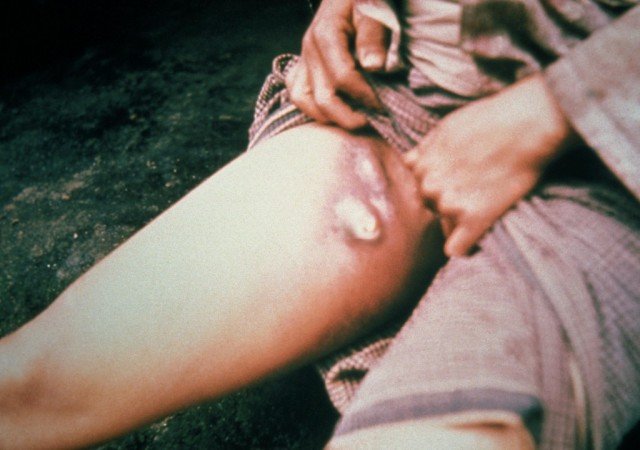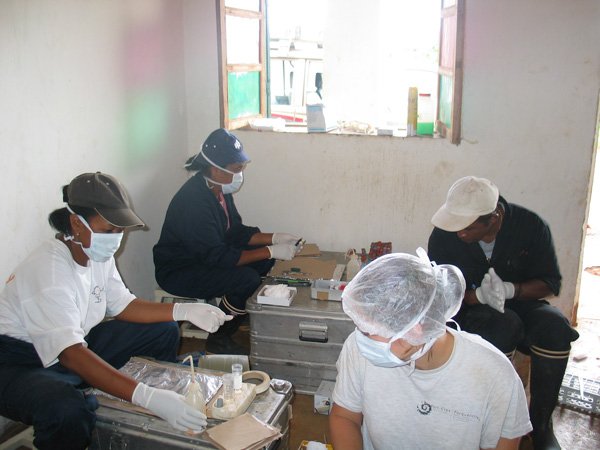Bubonic plague, known as the Black Death when it killed an estimated 25 million people in Europe during the Middle Ages, is now rare.
It is a bacterial disease mainly affecting wild rodents that is spread by fleas. Humans bitten by infected fleas can then develop bubonic plague.
Once bacteria infect the lungs, human-to-human transmission of pneumonic plague can occur through coughing.

Bubonic plague, known as the Black Death when it killed an estimated 25 million people in Europe during the Middle Ages (photo Wikipedia)
If diagnosed early, bubonic plague can be successfully treated with antibiotics, while pneumonic plague has a high mortality rate, the World Health Organization says.
The plague:
• Is one of the oldest identifiable diseases known to man
• Is spread from one rodent to another by fleas, and to humans either by the bite of infected fleas or when handling infected hosts
• Recent outbreaks have shown that plague may reappear in areas that have long been free of the disease
• Can be treated with antibiotics such as streptomycin and tetracycline
• Madagascar recently recorded 60 deaths from plague
Source: WHO
Yumen city in Gansu province, north-west China, has been partially sealed off and dozens of people placed in quarantine after a man died of bubonic plague on July 16, state media say.
A total of 151 people have been placed under observation, Xinhua news agency says. Authorities have isolated a part of the city centre and three sections of Chijin town which is an hour away.
The man was believed to have caught the infection after contact with a marmot.
Marmots are large, squirrel-type rodents that live in mountainous areas.
The victim is reported to be a 38-year-old man who had fed a dead marmot to his dog.

Yumen city has been partially sealed off and dozens of people placed in quarantine after a man died of bubonic plague (photo abcnews)
The deputy head of the hospital where the man died told reporters that the victim had arrived with an increased heart-rate and seemed to be slipping into shock. The hospital has since been quarantined.
It is not clear from reports how big the four quarantine zones are. Ten checkpoints have been set up around Yumen and Chijin.
Those in quarantine all had contact with the man, Xinhua said. None was showing signs of infection, it said.
Officials have told reporters that the group could be released after nine days of quarantine if no further cases of plague appeared among them.
Yumen is a small city in western Gansu province, which borders Xinjiang. The last reported case of bubonic plague in the city was in 1977, Xinhua said.
Gansu has seen at least five cases of the plague in the last 10 years, according to Xinhua.
Bubonic plague, known as the Black Death when it killed an estimated 25 million people in Europe during the Middle Ages, is now rare.
It is a bacterial disease mainly affecting wild rodents that is spread by fleas. Humans bitten by infected fleas can then develop bubonic plague.
Once bacteria infects the lungs, human-to-human transmission of pneumonic plague can occur through coughing.
If diagnosed early, bubonic plague can be successfully treated with antibiotics, while pneumonic plague has a high mortality rate, the WHO says.
[youtube 3qW2T9L40fY 650]
Experts have warned that Madagascar is facing a bubonic plague epidemic unless it slows the spread of the disease.
The Red Cross and Pasteur Institute say inmates in Madagascar’s dirty, crowded jails are particularly at risk.
The number of cases rises each October as hot humid weather attracts fleas, which transmit the disease from rats and other animals to humans.
Madagascar had 256 plague cases and 60 deaths last year, the world’s highest recorded number.
Bubonic plague, known as the Black Death when it killed an estimated 25 million people in Europe during the Middle Ages, is now rare.
The International Committee of the Red Cross (ICRC) in Geneva and the Pasteur Institute have worked with local health groups in Madagascar since February 2012 on a campaign to improve prison hygiene.
“If the plague gets into prisons there could be a sort of atomic explosion of plague within the town. The prison walls will never prevent the plague from getting out and invading the rest of the town,” said the institute’s Christophe Rogier.

Experts have warned that Madagascar is facing a bubonic plague epidemic unless it slows the spread of the disease
The ICRC said the 3,000 inmates of Antanimora, the main prison in the heart of the capital Antananarivo, live with a huge rat population which spreads infected fleas through food supplies, bedding and clothing.
The ICRC’s Evaristo Oliviera said this could affect not only inmates and staff, but others they come into contact with.
Evaristo Oliviera said the disease could be treated with antibiotics if detected early, but a lack of facilities and traditional shame over the disease made this tricky in outlying parts of Madagascar.
Experts say that Africa – especially Madagascar and the Democratic Republic of Congo – accounts for more than 90% of cases worldwide.
However, in August a 15-year-old herder died in Kyrgyzstan of bubonic plague – the first case in the country in 30 years – officials said
During the last 20 years, at least three countries experienced outbreaks of human plague after dormant periods of about 30-50 years, experts say.
These areas were India in 1994 and 2002, Indonesia in 1997 and Algeria in 2003.
According to the WHO, the last significant outbreak of bubonic plague was in Peru in 2010 when 12 people were found to have been infected.
What is bubonic plague?
- Caused by the bacterium Yersinia pestis
- Essentially a disease of wild rodents, spread by fleas
- Plague spreads to humans either by the bite of infected fleas or rats
- Does not spread from person to person
- Patients develop swollen, tender lymph glands (called buboes) and fever, headache, chills and weakness
- It is treatable if caught early, but can be lethal



